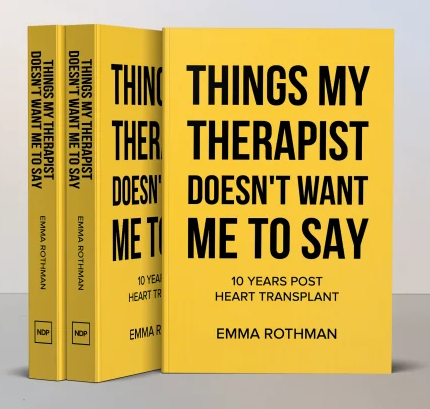
The events of our life and the stories others hold about us are often entirely outside of control. The loss of autonomy over one’s own life narrative and the resulting struggle to find one’s own sense in a chaotic world is a part of what it means to be human.
InThings My Therapist Doesn’t Want Me To Say, Emma Rothman writes her way through finding sense through her own life’s messiness. Rothman, who graduated Syracuse University in 2021 with a degree in Food Studies from Falk College of Sport and Human Dynamics, is well acquainted with events that turn one’s world upside down.
Ten years ago, Rothman was the recipient of a heart transplant. Previously fully healthy, Rothman’s heart transplant disrupted her childhood and involved years of learning to live with chronic illness. While it may not be hard to imagine how learning how to live as a heart transplant changed the world of a middle school girl, Rothman was also struggling with something else: the loss of her own life’s narrative.
When Rothman was in a coma, undergoing heart transplant surgery, her entire town rallied behind her. “Everyone wanted to help but didn’t know how,” Rothman recalled of the situation. “There were card-making groups, multiple blood drives being held in my honor, and carpooling back and forth from the hospital.”
While this community did much to support Rothman and her family, once she woke up from her coma; what she needed was private time to process the changes in her life. Yet everyone in her life knew what had happened to her. To her community, Rothman’s identity had shifted to being the girl with the heart transplant.
From middle school to college, Rothman struggled with this identity of the girl with the heart transplant. Guilty at failing to live less than a perfect life in honor of her heart donor, Rothman said yes to everything. She said yes to organ donation and transplant awareness events, to advocacy meetings, to public speaking, to representing the various organizations that enable people to have healthy, life-saving transplants, to being a perfect student, to living a perfect life.
Yet through all this Rothman struggled to define and understand what living a fulfilling life meant to her, not her donor. The picture of herself as a successful heart recipient living life to the fullest didn’t reflect her reality of life as a heart recipient being difficult, isolating, and some days downright awful. But still she felt obligated to fill this role of giving back. “I had this guilt that was really heavy. It also made me angry that I felt bad for not wanting to be responsible for talking to all these different groups,” said Rothman.
Rothman’s grapple with all these complex feelings caused her to turn towards writing as a solace. This past year, as the ten-year anniversary of her heart transplant, a new phase of her life as she graduated from college, and ongoing difficulty of the COVID-19 pandemic, Rothman used writing as an outlet to navigate her different struggles.
The idea for turning these personal writings into her book blossomed when Rothman served as a mentor for the Blackstone LaunchPad at Syracuse University and was contacted by the founder of the Creator’s Institute through a LinkedIn direct message.
Having always wanted to write a book in her lifetime, Rothman seized on the opportunity and began transforming her life story and feelings into essays. For her, the personal importance of the book lies in her ability to reclaim her narrative that was shared with her community before she had the chance to comprehend what had happened, as a heart transplant recipient. “The illusion of wanting to control my story motivated me to write the book,” said Rothman.
Beyond reclaiming her own narrative, Rothman hopes the book will create empathy and learning surrounding people living with chronic illness. Because of COVID-19, society suddenly became aware of what it meant to be immuno-compromised or what it meant to live a life that can be dictated by your health. Rothman hopes that this inclusion and awareness extends into the future and hopes her book will play a part in opening people’s eyes to the unique experience of what it is like to live with a transplant.
Currently, Rothman is raising money for the publication of Things My Therapist Doesn’t Want Me To Say here. The release of the book is due in September, and various funding levels initiate the release of softcover, hardcover, digital, and audiobook copies.
Rothman’s journey towards writing Things My Therapist Doesn’t Want Me to Say has been a journey of her learning how to live life through her heart transplant and more importantly, living a life where she has autonomy over her own story. Things My Therapist Doesn’t Want Me to Say is a collection of resilience in the face of great trouble and learning how to flourish in the messiness of life.
Story by Claire Howard ’23, Global Fellow.